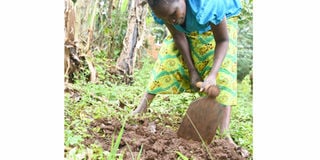Farmers should be saved from middlemen to end hunger

Support towards smallholder farmers is key to creating zero-hunger. pHOTO/ Edgar R. Batte.
What you need to know:
The Sustainable Development Goals (SDGs) aim to end all forms of hunger and malnutrition by 2030, making sure all people–especially children–have sufficient and nutritious food all year.
The Covid-19 pandemic has hit small scale farmers hard. A report by Heifer International states incomes of more than 87 percent small scale farmers were cut by half since March 2020.
Farmers who once earned an average of Shs100, 000 a month are now surviving on a mere Shs60, 000. Another report by United Nations Uganda, dubbed ‘Analyses of the socioeconomic impact of Covid-19 in Uganda’, observes that there was interruption of farm input supply due to travel restrictions, especially on public transport; disruption of food distribution in urban areas as a result of social distancing rules.
Samuel Munezero is a sweet potato farmer and says that the lockdown has been a challenging time for him to supply his produce. He was left at the mercy of middlemen who would dictate the price, many times giving him really low prices that would not let him break even.
In search of a solution, his online engagement led him to Agro Fresh UG, an online platform which has linked him with consumers for a more lucrative arrangement for his produce.
Its director, Laban Musinguzi got the idea during lockdown. With no job but time, he decided to create the platform to supply organic agro produce to consumers.
“We are working with a small scale with an acreage of 50 and below and large scale farmers. We do not deal in genetically modified foods. We link up with the farmer right from the planting season to the time of harvesting. Our target clientele are middle income earners; 80 per cent of these can afford a smartphone, and low income earners for whom we have opened stores, in Kigungu and in Ntinda where we will have the agricultural produce from farmers for their access,” Musinguzi explains.
He adds that unlike other platforms that sell farmers’ produce in kilogrammes, they are emphatic on selling items in quality over quantity, from organic animals to plant agricultural products in Kampala and Entebbe, on delivery.
The World Bank (WB) estimates that the agricultural sector employs 70 per cent of the population and contributes a quarter of the country’s gross domestic product (GDP).




